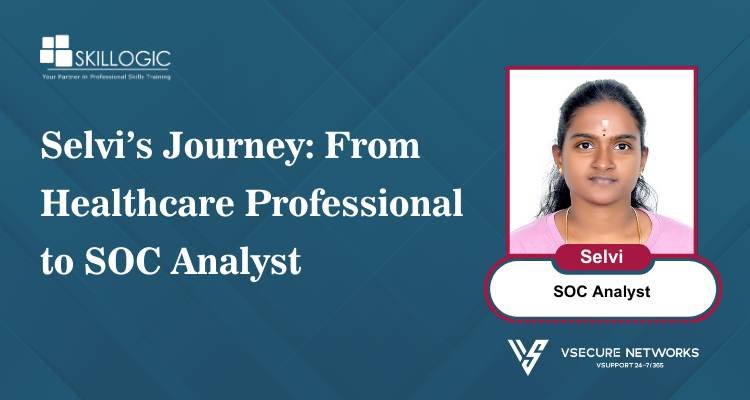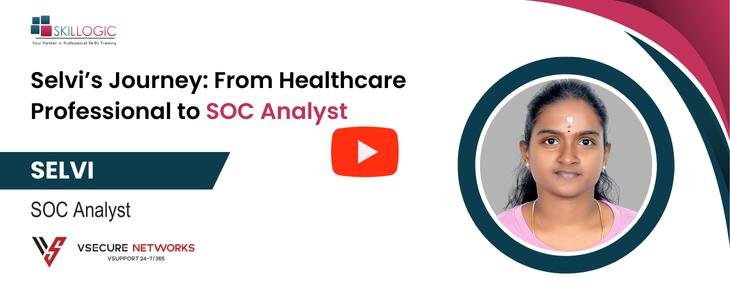Selvi’s Journey: From Healthcare Professional to SOC Analyst
Discover Selvi’s inspiring journey from a healthcare professional to a SOC Analyst, highlighting her cyber security training, hands-on projects, mock interviews, and career transition tips.

With cyber threats increasing across industries, the demand for skilled cyber security professionals is rising rapidly. Many individuals, even those from non-technical backgrounds, are exploring this field to build a secure and rewarding career. Selvi’s story is one such example of how determination and structured learning at SKILLOGIC Institute can help overcome challenges and create new opportunities.
Having worked for several years outside the IT sector, Selvi decided to pursue a career in cyber security after developing an interest in online security risks. She enrolled in a comprehensive course at SKILLOGIC Institute, where consistent practice, expert guidance, and hands-on projects helped her gain the necessary skills. Through unwavering patience and dedication, she successfully transitioned into the role of a Security Operations Center (SOC) Analyst at Vsecure Networks in Chennai. Her journey offers valuable insights and motivation for anyone aiming to enter the cyber security domain.
Let’s explore how Selvi made a seamless transition into cyber security and what we can learn from her journey.
Insights from Selvi’s Cyber Security Course Journey to SOC Analyst Role
In this section, we share how Selvi’s training in the Cyber Security course helped her become a SOC Analyst. The practical learning, mentorship, and constant support made her transition smooth. These factors are key for anyone switching careers.
Q1: Your work experience before cyber security?
I completed my BCA degree and initially took up a job outside the IT sector due to the need for employment. I worked for five years in a business operations setup, starting as a trainee process consultant and eventually becoming a team lead. This experience helped me build communication skills, customer handling abilities, and leadership qualities. I even trained new joiners and helped the team function smoothly in my absence. It was a valuable experience, and the environment was very supportive.
Q2: What inspired your transition to cyber security?
While working in the operations team, I noticed phishing attacks becoming a major crisis. It sparked my curiosity, and I wanted to understand how cyber threats happen and how they can be mitigated. That’s when I decided to pursue a cyber security course and switch careers. I believe that everyone’s journey is different, and for me, cyber security was the next step to grow professionally.
Q3: How did you manage the transition while handling old responsibilities?
I didn’t want my team to suffer, so I trained two members under me and ensured they could handle operations without my presence. I shared my knowledge and responsibilities before leaving. Although it was hard to leave, I prioritized my career goals and made a smooth transition with the full support of my team and seniors.
Q4: What training did you undergo and its benefits?
I joined a four-month cyber security course that included practical projects and an internship. The course started from the basics and covered various tools used in real-world scenarios. Practical sessions with tools like OWASP ZAP and Wireshark made the learning experience enjoyable and hands-on. The trainers were highly supportive and patient, especially Akbar Sir, who explained everything in simple terms. This approach helped me gain confidence and knowledge quickly.
Q5: Was learning cyber security after a gap difficult?
Yes, the first few weeks were challenging because I had no prior exposure to IT tools. Initially, my laptop had technical issues, and I couldn’t access tools for a week. During this time, I wrote down every step taught in class and practiced repeatedly at home. Consistent effort and patient guidance from trainers helped me overcome these challenges. Eventually, the tools became easier to use, and I gained hands-on experience.
Q6: How did mock interviews help for real interviews?
The mock interviews were tough initially. In my first attempt, I scored only 5.2 out of 10 and missed many questions related to real-time scenarios. However, I took feedback seriously, practiced more, and improved my answers. By the fourth attempt, I scored above 6 and felt confident going into real client interviews. The questions asked in mock sessions closely resembled those in actual interviews, which made the preparation very effective.
Q7: How did you handle failures and stay motivated?
I believe failures are part of learning. When I failed the first few mock interviews, I noted down my mistakes and worked on them. Even when I didn’t get callbacks after interviews, I stayed focused and patient. I reminded myself that persistence is key and that every experience adds value. Having supportive trainers and peers around me helped me stay motivated.
Q8: What support did you get from SKILLOGIC?
SKILLOGIC provided tremendous support throughout my journey. The trainers clarified doubts even after class hours, and the placement team kept sharing opportunities, JD details, and interview tips. They helped me tailor my resume to match industry standards, shared sample formats, and gave me pointers based on the role I was applying for. Their guidance helped me approach interviews confidently.
Q9: How did you prepare your resume for cyber security?
I prepared my resume by highlighting my relevant skills, the tools I learned, and my experience from the course projects. With guidance from SKILLOGIC’s placement team, I included trending cyber security terms and key responsibilities relevant to the SOC Analyst role. The team provided sample resumes and corrected mine to ensure it aligned with industry expectations.
Q10: Any advice for those starting a cyber security career?
My key advice for anyone preparing for a career in cyber security is to first understand the role you want and prepare accordingly. Carefully review the job description (JD) and focus on trending tools and vulnerabilities that are currently in demand. Consistent practice is crucial, as hands-on experience with tools helps build confidence and problem-solving skills. It’s important not to lose heart if you fail early on. Every mistake is a learning opportunity that helps you improve. Whenever you face challenges, don’t hesitate to seek guidance from trainers and peers. Finally, always keep learning, as cyber security is an ever-evolving field, and staying updated is essential to remain effective and competitive.
Refer these articles:
- Mahendra’s Journey: From Email Support to SOC Analyst
- Chandrakant’s Journey: From Learner to Cyber Security Analyst
- Yogesh’s Cyber Security Path: From Beginner to Defender
Key Insights from Selvi’s Move into the Cyber Security Field
Selvi’s inspiring career transition highlights how the right guidance, practical training, and consistent efforts can help professionals from non-IT backgrounds succeed in cyber security. Her experience reflects the importance of structured learning, hands-on practice, and personalized support core aspects of SKILLOGIC’s specialized approach to cyber security training and placement.
- Structured Training Builds Foundations: Courses start with cyber security basics, helping even non-IT learners understand key concepts and tools.
- Hands-on Practice Boosts Skills: Learners use tools like OWASP ZAP and Wireshark to gain practical experience for real security tasks.
- Personalized Guidance Simplifies Learning: Trainers break complex topics into simple steps and provide support beyond class hours.
- Mock Interviews Improve Readiness: Multiple mock interviews give feedback to enhance problem-solving and communication for real interviews.
- Cybersecurity Resume Prep Enhances Opportunities: Placement team helps craft resumes highlighting tools, vulnerabilities, and relevant experience.
- Focus on Trending Practices: Training covers current threats like phishing and OWASP top 10 vulnerabilities to stay industry-relevant.
- Supportive Environment Motivates: Continuous mentor support and feedback help learners overcome challenges and stay resilient.
- Projects Strengthen Problem-Solving: Hands-on projects with tools like Bobsuit and Wireshark improve analytical and troubleshooting skills.
In short, Selvi’s journey shows how determination, guidance, and continuous learning can help overcome career-switch challenges. Even with limited experience, anyone can succeed in cyber security by practicing consistently, leveraging the right training, and embracing failures as learning opportunities. Her story inspires aspiring professionals to build practical skills, prepare thoroughly, and confidently step into new roles in this evolving industry
Refer these articles:
- How to Build a Cyber Security Engineering Career in Chennai
- Why Ethical Hacking Career in Chennai
- Steps to Pursue a Career as a Cyber Security Engineer in Bangalore
- Why Ethical Hacking Career in Bangalore
The global cyber security market is rapidly growing and is projected to reach USD 878.48 billion by 2034, with a CAGR of 12.6% from 2025, according to Precedence Research. In 2025, the market is estimated at USD 301.91 billion. North America leads with over 36% market share, while Asia-Pacific is the fastest-growing region. Growth is driven by AI integration, increasing demand for cloud security, stricter data protection regulations, and rising cyberattacks. Services and infrastructure protection dominate the market, reflecting the critical need for skilled professionals, including SOC analysts, to safeguard digital assets globally.
SKILLOGIC offers a comprehensive Cyber Security Certification course to equip learners with industry-ready skills. Our Cyber security Professional Plus program includes Ethical Hacking Course, SOC Certification Course, network security, threat analysis, and vulnerability management. The program spans 4 months with more than 200 learning hours, providing 24/7 cloud lab access, practical labs, real-time projects, and coverage of essential cyber security domains. Learners are prepared for globally recognized certifications like NASSCOM FutureSkills and IIFIS. Flexible class timings suit students and working professionals, making this the ideal cyber security course in Chennai.
Participants progress through modules like penetration testing, IDS/IPS management, SIEM tools, malware analysis, and compliance standards. The Ethical Hacking Course focuses on offensive skills, while the SOC Certification Course trains learners to monitor and respond to cyber threats. Both courses ensure a well-rounded understanding of cyber security operations.
SKILLOGIC has major branches including Bangalore, Pune, Hyderabad, Jaipur, Noida, Kochi, and Chennai, making it accessible across India. Our cyber security institute in Bangalore is popular among IT professionals seeking advanced cyber security expertise. Experienced trainers guide learners in both theory and practical implementation.
Completing SKILLOGIC’s program prepares learners for certifications like NASSCOM FutureSkills and IIFIS, enabling careers as SOC Analysts, Penetration Testers, Security Consultants, or Cybersecurity Engineers. The curriculum combines hands-on practice, career support, and placement assistance, providing a solid foundation for a successful cyber security career.


0
82